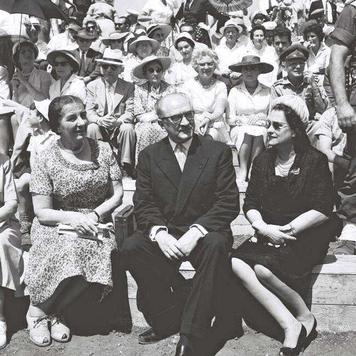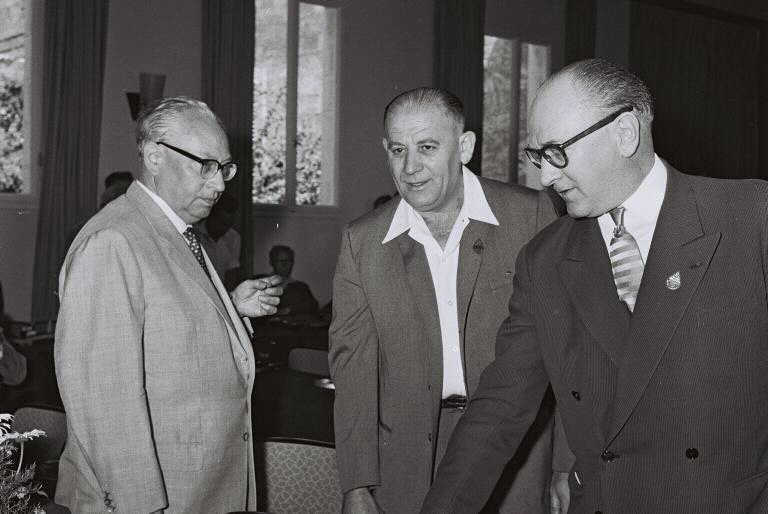<Back to Index>
- Prime Minister of France Guy Mollet, 1905
PAGE SPONSOR
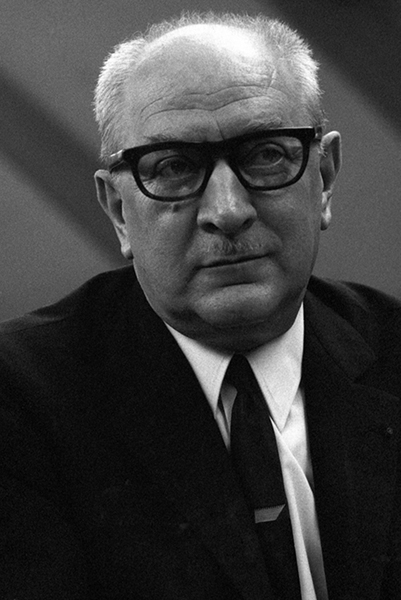
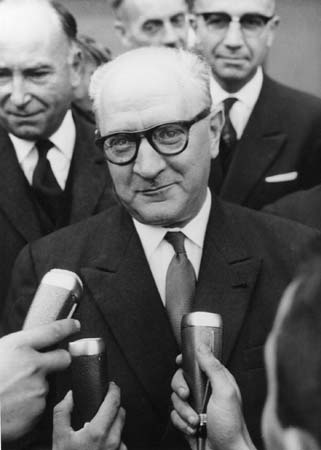
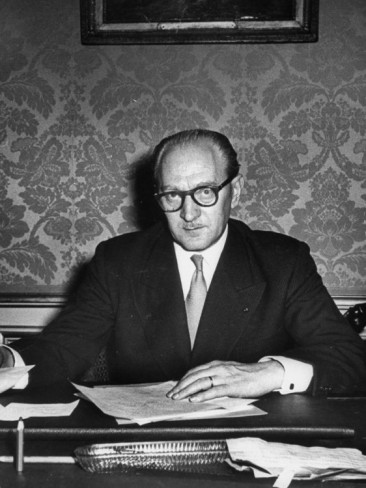
Guy Mollet (31 December 1905 – 3 October 1975) was a French Socialist politician. He led the French Section of the Workers' International (SFIO) party from 1946 to 1969 and was Prime Minister in 1956 – 1957.
He was born in Flers, Orne, in Normandy, the son of a textile worker. He was educated in Le Havre and became a school teacher in Arras. Like most teachers, he was an active member of the French Socialist Party, then called the SFIO, and in 1928 he became SFIO Secretary for the Pas - de - Calais département. He joined the French Army in 1939 and was taken prisoner by the Germans. Released after seven months, he joined the Resistance in the Arras area and was three times arrested and interrogated by the Gestapo.
In October 1945, Mollet was elected to the French National Assembly as representative of Pas - de - Calais. In 1946 he became Secretary General of the SFIO, standing against Daniel Mayer, the candidate supported by Léon Blum. Mollet represented the left wing of the party which feared the dissolution of the Socialist identity in a centrist conglomerate. However, if he kept a Marxist language, he accepted the alliance with the center and center - right parties during the Fourth Republic. Besides, his relations with the French Communist Party (PCF), which had become the largest left wing party, were very poor. Indeed, in his mind, "the Communist Party is not on the left, but in the East".
In this, he served as vice Prime minister in 1946. In 1950 – 51 he was Minister for European Relations in the government of the Radical René Pleven, and in 1951 he was Deputy Prime Minister in the government of Henri Queuille. He represented France at the Council of Europe, and was President of the Socialist Group on the Council's Assembly. From 1951 to 1969 he was Vice President of the Socialist International.
During the 1956 legislative campaign, he created a center left coalition called the Republican Front with the Radical Party of Pierre Mendès - France, the Democratic and Socialist Union of the Resistance led by François Mitterrand and the Social Gaullists headed by Jacques Chaban - Delmas.
It won the election in promising to re-establish the peace in Algeria. Leader of the main party of the coalition, Mollet led and formed the cabinet in January 1956.
Although Mollet wanted to concentrate on domestic issues, he found himself confronted with a major foreign policy issue, concerning Egyptian President Gamal Abdel Nasser's continued support for Algerian nationalists, and his nationalization of the Suez Canal, which lead to the Suez Crisis.
As that crisis escalated, previously secret British cabinet papers show that in September 1956, Mollet requested to merge France and the United Kingdom and again, two weeks later, for France to join the Commonwealth of Nations. Both requests were turned down by the British prime minister Anthony Eden, and a year later France signed the Treaty of Rome with Germany and the other founding nations of the Common market.
In addition to mutual concern for maintaining their foreign possessions, and Mollet's concern with Nasser's Algeria involvement, Eden feared that Nasser intended to cut off oil supplies to Europe. As a result, in October 1956 Mollet, Eden and the Israeli Prime Minister, David Ben - Gurion met and secretly colluded to attack Egypt jointly. The Israelis invaded Egypt first, with British and French troops invading the northern Suez Canal area, shortly thereafter. But the scheme met with unexpected opposition from the United States, both at the United Nations and economically; France and the United Kingdom were forced into a humiliating backdown. Eden resigned as a result, but Mollet survived the crisis, despite fierce criticism from the left.
In Michael Karpin's 2001 documentary "A Bomb in the Basement", Abel Thomas, chief of political staff for France's defense minister at the time said Francis Perrin, head of the French Atomic Energy Commission, advised then Prime Minister Guy Mollet that Israel should be provided with a nuclear bomb. According to the documentary, France provided Israel with a nuclear reactor and staff to set it up in Israel together with enriched uranium and the means to produce plutonium in exchange for support in the Suez War.
Like the rest of the French left, Mollet opposed French colonialism, and had supported Mendès - France's efforts in office to withdraw from Tunisia and Morocco (who were granted independence in 1956 by the loi - cadre Deferre). Mollet's government was left with the issue of the three departments of Algeria, where the presence of a million French settlers made a simple withdrawal politically impossible.
At first, Mollet's policy was to negotiate with the National Liberation Front (FLN). Once in office, however, he changed his mind and argued that the FLN insurgents must be defeated before negotiations could begin. Mollet's visit to Algiers was a stormy one, with almost everyone against him. He was pelted with rotten tomatoes at a demonstration in Algiers on 6 February 1956, a few weeks after becoming prime minister. The French refer to this memorable event as "la journée des tomates".
He poured French troops into Algeria, where they conducted a campaign of counter terrorism including torture, in particular during the Battle of Algiers which took place from January to October 1957. This was too much for most French, and Mollet's government collapsed in June 1957 on the issue of taxation to pay for the Algerian War. The Secretary of State to Foreign Affairs Alain Savary, also a SFIO member, resigned because of his opposition to Mollet's hardline stance in Algeria.
Mollet's cabinet led a social policy which went unnoticed due to the international context and the Algerian War. Substantial improvements were made in welfare provision for the sick and elderly, funding for regional aid and housing was increased, veteran’s payments were extended, and a third week of paid holidays was introduced. Mollet's government passed other pieces of social legislation during its time in office, including an increase in wages, improved medical benefits, and a social welfare fund for the elderly. The level and mechanism of state pensions to both the elderly and chronically ill was improved, while working class housing was also given close attention, with HLM’s receiving top priority in the government’s target of 320,000 houses in 1956. In addition, the government reduced regional differences in minimum wage standards across France. Financial constraints, however, prevented the passage of other planned reforms, such as the refunding of a higher percentage of prescription charges, extended rights for comites d’enterprise, and the compulsory arbitration of works disputes.
In foreign policy, Mollet negotiated and signed the Treaty of Rome, creating the European Economic Community. Liberalizing reforms were carried out in various parts of the French Empire, although not in Algeria. Gaston Deferre’s loi - cadre of the 23 June 1956 generalized universal suffrage throughout the territories d’outre - mer and based their assemblies on a common voting roll.
Mollet's cabinet was the last government formed by the SFIO, which was in increasing decline, and also the last stable government of the Fourth Republic. The Algiers coup of 1958 led by First Indochina War and Suez Crisis veterans brought Charles de Gaulle to power from retirement and in effect seized power. Mollet supported him on the grounds that France needed a new constitution which would allow the formation of strong governments. De Gaulle appointed him one of four Secretaries of State in his first cabinet. This caused the creation of the PSU, the Unified Socialist Party, formed by the PSA Autonomous Socialist Party and the UGS (Union de la Gauche Socialiste, a split of the SFIO).
Mollet resigned from de Gaulle's cabinet in 1959 and did not hold office again. He remained Secretary General of the SFIO, but under de Gaulle's new system, the Fifth Republic, it was a powerless opposition party, and by the 1960s it was in terminal decline.
During the 1965 presidential campaign, he presented himself again like the attendant of the Socialist identity and opposed to the candidacy of Gaston Defferre, who proposed the constitution of a "Great Federation" with the non - Gaullist center right. He accepted to support François Mitterrand's candidacy and participated to the center left coalition called Federation of the Democratic and Socialist Left. But it split three years later.
His leadership over the party was more and more challenged. He could not prevent the designation of Defferre as SFIO candidate at the 1969 presidential election. This one obtained a disastrous result (5%) which swallowed up the SFIO and Mollet too. The party merged with left wing clubs in a new Socialist Party, which Mollet abandoned the leadership to Alain Savary. However, the internal opposition accused Mollet to be stood the real leader of the party. It allied with François Mitterrand, who joined the party during the Epinay Congress and took the lead in 1971.
Mollet and his followers were ejected in the minority of the party. He mocked the Socialist speeches of Mitterrand: "he is not socialist, he has learned to speak socialist".
Guy Mollet died in Paris in 1975 of a heart attack. He is one of the most controversial of the French Socialist leaders. His name is tied up with the SFIO decline and his repressive policy in Algeria. In French political language, the word molletisme equates to duplicity, making left wing speeches to win elections then implementing a conservative policy. French Socialist politicians currently prefer the moral authority of Pierre Mendès - France, although he was not member of the party.
His biography, by Denis Lefebvre, was called Guy Mollet: Le mal aimé (Guy Mollet: The Unpopular Man).
